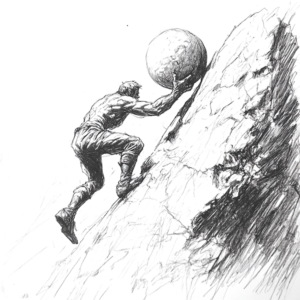Do Your Thing. Do It for Decades.
October 21, 2024
I’ve always been intrigued by people who believe in conspiracy theories. Interestingly, it rarely stops at just one theory. These folks often surprise me with a whole set of incredible beliefs. Over time, I noticed a pattern.
This pattern becomes clear when we ask: why don’t these people see how bizarre their views are?
The answer is simple – they acquired these beliefs gradually. What started ten years ago as accepting a few harmless-sounding explanations about, let’s say, social inequality, gradually developed into a complex network of interconnected beliefs. It’s similar to people who’ve gone overboard with plastic surgery, bodybuilding, or tattoos covering 95% of their bodies. They didn’t start at their current level. They got there step by step.
Time’s Quiet Power
Gradual change is a force that can shape our lives, often unnoticed. It’s like gravity in the world of ideas and behaviors – invisible but omnipresent.
Bill Gates said, “Most people overestimate what they can do in one year and underestimate what they can do in ten years.”
A year is often too short to see the real effects of our actions. It’s like trying to watch the hour hand move – it seems stationary. But look at it after a few hours, and the change is evident.
Fortunately, this force can be used constructively. Just as we can trick ourselves into holding strange worldviews, we can also achieve things that seem impossible from a one or two-year perspective.
Learning Through Building
I’ve seen this up close in the tech world. Projects that started as simple scripts evolved into complex systems serving thousands of users over the years.
When we began working on our algorithmic trading system over a decade ago, we were convinced we’d create something groundbreaking in a few months. Reality quickly checked us. After a year, we barely had a working prototype. Luckily, it was enough to convince our first big client, who probably had more sympathy for our enthusiasm than benefits from our software. Now, we have a system far beyond our initial visions, running on nearly a hundred virtual machines, making tens of thousands of transactions daily, integrated with a data warehouse that allows us to improve our algorithms further.
The Long Game
What does this all mean? First, we should be cautious in judging the short-term effects of our actions – both positive and negative. What seems like a small failure or success today might be the beginning of something much bigger.
Second, we should appreciate the power of consistency. Our fast-paced world seems to reward immediate results, but a long-term commitment builds an edge. Consistency allows us to try dozens of things and find what works. It also lets us observe and learn from masters in our fields and gradually become like them.
Our beliefs, habits, and skills are constantly evolving. Who we are today results from many past decisions and actions. And who we’ll be in 10 years depends on the decisions we’re making now.
Gradual change is like compound interest. Small, daily choices seem insignificant. But accumulated over the years, they define our lives. So, do your thing; do it for decades.
Michal




